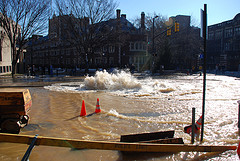What Happens When a Water Main Breaks?
 Have you ever seen a water main break? It can be extremely dramatic. A broken pipe causes water to shoot out from under the ground with incredible force, creating a geyser that can rise many feet into the air. Gallons upon gallons of water are spewed into the street and can flood nearby buildings. One of the most awesome (in the old-fashioned sense of the word) effects is the opening of great holes in the ground that, like something out of a science fiction movie, can swallow up cars.
Have you ever seen a water main break? It can be extremely dramatic. A broken pipe causes water to shoot out from under the ground with incredible force, creating a geyser that can rise many feet into the air. Gallons upon gallons of water are spewed into the street and can flood nearby buildings. One of the most awesome (in the old-fashioned sense of the word) effects is the opening of great holes in the ground that, like something out of a science fiction movie, can swallow up cars.
While a problematic water main pipe right in your front yard is not likely to produce quite such turmoil, it still requires urgent attention. Find out what causes a water main break and how to fix it.
What Are Water Mains and Who is in Charge?
The term "water mains" refers to the system of subterranean pipes that carry water from the regional source of supply -- usually a reservoir or pumping station -- to your street and from there to your home plumbing. The city or town where you live is in charge of fixing breaks in the public mains. However, generally you, the homeowner, will be responsible for repair or replacement of the water main supply line directly connected to your house, up until the faucet.
What is the Number One Reason for a Water Main Break?
The main reason for breakage or malfunction of water mains is corrosion. Older plumbing pipes were manufactured of iron -- originally cast iron, which was gradually replaced by ductile iron. Iron pipes will rust over the years, especially in an area with clay soil. This corrosion can affect the mains in two ways: 1) the pipes can gradually be blocked as rust builds up inside. 2) the weakened pipes may develop a crack or hole.
Can Any Other Factors Cause Breakage?
Yes. In cold climates, the earth goes through continual cycles of freezing and thawing, which can damage water mains. As the roots of your property's trees mature and grow deeper into the soil or your house settles with time, this can also result in cracked or burst underground water pipes.
How Can I Identify a Broken Water Main on My Property?
If your plumbing problem is simply a pipe blockage, you're likely to notice reduced pressure and/or volume when you turn on the shower or faucet in your home. A water main break will result in water leakage, which can turn your front yard into a swamp. You might also detect an unpleasant odor. A good clue that you could possibly have a leak somewhere in the system is an inexplicable increase in your water bill.
What's the Fix for a Damaged Water Main?
A broken or clogged water main will need repair or replacement of the pipe, depending on how serious it is and exactly where the damage is located. This is further complicated by the fact that the pipe is buried underground. (Usually the colder the winters are in your area, the deeper the piping will be buried.) You may need your plumber to dig a trench in your yard, a time-consuming and messy business. A newer technique is trenchless pipe replacement, which is much quicker and less invasive. Nowadays, PEX pipe is normally used instead of metal for sewer pipe replacement, eliminating the risk of rusting.
Are There Any Precautions I Should Take After a Water Main Break?
- Contact your local health department to see whether your household water is safe to use for drinking, cooking, and bathing.
- Check whether you will need a permit before you hire a plumber to excavate your yard or work on your water main.
- Speak with your homeowners' insurance provider to see whether you have coverage for water main damage.
- Make sure that you get a warranty on water main replacement or repair.
Laura Firszt writes for networx.com.
Updated November 18, 2018.
Looking for a Pro? Call us (866) 441-6648

Plumbing Average Costs
Plumbers Experiences

Thoroughly Modern Bathroom Remodel

Garbage Disposal Replacement Just Before New Tenant Arrived



